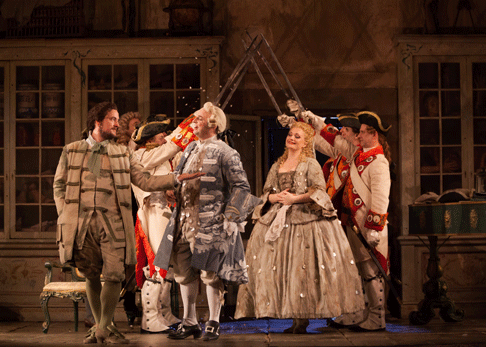The programme
book mentioned commedia dell’arte: Tanya McCallin’s designs are of
that world, certainly, even if there does not seem to be a great deal in
Miller’s production that goes beyond the general ‘look’ of that
tradition. Unlike many endlessly revived productions, this, then, is not in
itself particularly tired, and one can readily imagine it offering the
opportunity for new casts to come in and assume their roles without a great
deal of stage rehearsal. By the same token, when compared with, for instance,
John Copley’s considerably more venerable Royal
Opera La bohËme, which I happened to see earlier in the month,
the staging does not especially sparkle, enlighten, or indeed charm either. It
would do no harm to have a little Regietheater cast Rossini’s way. Either
that, or assemble a cast whose sparkle would lift the work above the merely
quotidian.
I say ‘the work’, but this performance, unfortunately, put me in mind of
Carl Dahlhaus’s ‘twin musical cultures’ of the nineteenth century: too
clear a distinction, no doubt, but nevertheless heuristically useful. On the
one hand, one has the culture of the musical work, as understood in an emphatic
sense, that of Beethoven and his successors; on the other, one has ‘a Rossini
score … a mere recipe for performance, and it is the performance which forms
the crucial aesthetic arbiter as the realisation of a draft rather than an
exegesis of a text’. The problem was that this performance, taken as a whole,
simply did not sparkle as Rossini must. One therefore became of the score as a
decidedly inferior, indeed well-nigh interminable work. Repetitions grated and
a good part of the audience was espied, furtively or less furtively, glancing
at wristwatches. If Rossini’s ‘musical thought hinged on the performance as
an event,’ then this was an unhinged performance — and not, alas, in the
expressionistic sense.
 Benedict Nelson as Figaro, Andrew Kennedy as Count Almaviva and Lucy Crowe as Rosina
Benedict Nelson as Figaro, Andrew Kennedy as Count Almaviva and Lucy Crowe as Rosina
Jaime Martin’s conducting started well enough. There was throughout a
welcome clarity in the score; this was not, at least, Rossini attempting and
failing to be Mozart or Beethoven. Give or take the odd orchestral slip, there
might have been much to enjoy in the contribution of the ENO Orchestra,
considered in itself. However, impetus was soon lost, and any ‘purely
musical’ tension soon sagged. Whether the first act were actually as long as
it felt, I am not sure, but many during the interval opined that it seemed as
though it was never going to end. If Rossini’s repetitions as opposed to
development serve a dramatic purpose, one can readily forget them; here they
were apparent in unfortunately lonely fashion. I could not help but mentally
contrast the extraordinary use to which Beethoven, for instance in the
Waldstein Sonata, puts simple tonic and dominant harmony, to the
tedium induced on this occasion. For some reason, the fortepiano was employed
as a continuo instrument: a strange fashion, which has enslaved musicians who
would never think of using it in solo repertoire. Performance, then, failed to
elevate the ‘work’. At least the English translation, by Amanda and Anthony
Holden was a cut above the average.
The greater fault in any case lay elsewhere, above all in Andrew Kennedy’s
Almaviva. His casting seemed simply inexplicable. Almost entirely lacking in
coloratura, let alone Florez-like facility therewith, he resorted to mere
crooning, a state of affairs worsened by the application at seemingly random
intervals of unnervingly thick vibrato. His stage presence was of a part with
his vocal performance. Benedict Nelson’s Figaro started off in reasonably
convincing fashion, but by the end was somewhat hoarse and throughout lacked
the pinpoint precision that might have lifted the performance. By contrast,
Lucy Crowe was an excellent Rosina. Her coloratura was impeccable, her gracious
stage presence no less so. Andrew Shore reminded us of his skills as a comic
actor in the role of Doctor Bartolo, and Katherine Broderick also took the
opportunity to shine as Berta. Sadly, the increasingly lacklustre conducting
and the embarrassing performance of Kennedy conspired to negate those positive
aspects of the performance, rendering one tired with the ‘work’, however it
were considered.
Mark Berry
Cast and production information:
Count Almaviva: Andrew Kennedy;
Figaro: Benedict Nelson; Rosina: Lucy Crowe; Doctor Bartolo: Andrew Shore; Don
Basilio: David Soar; Berta: Katherine Broderick; Ambrigio: Geraint Hylton; An
Official: Roger Begley; A Notary: Allan Adams. Director: Jonathan Miller;
Revival director: Peter Relton; Designs: Tanya McCallin. Orchestra and Chorus
of the English National Opera (chorus master: Genevieve Ellis)/Jaime Martin
(conductor). The Coliseum, London, Monday 25 February 2013
image=http://www.operatoday.com/Crowe_Barber_ENO.gif
image_description=Lucy Crowe as Rosina [Photo by Scott Rylander courtesy of English National Opera]
product=yes
product_title=Barber by ENO
product_by=A review by Mark Berry
product_id=Above: Lucy Crowe as Rosina
Photos by Scott Rylander courtesy of English National Opera